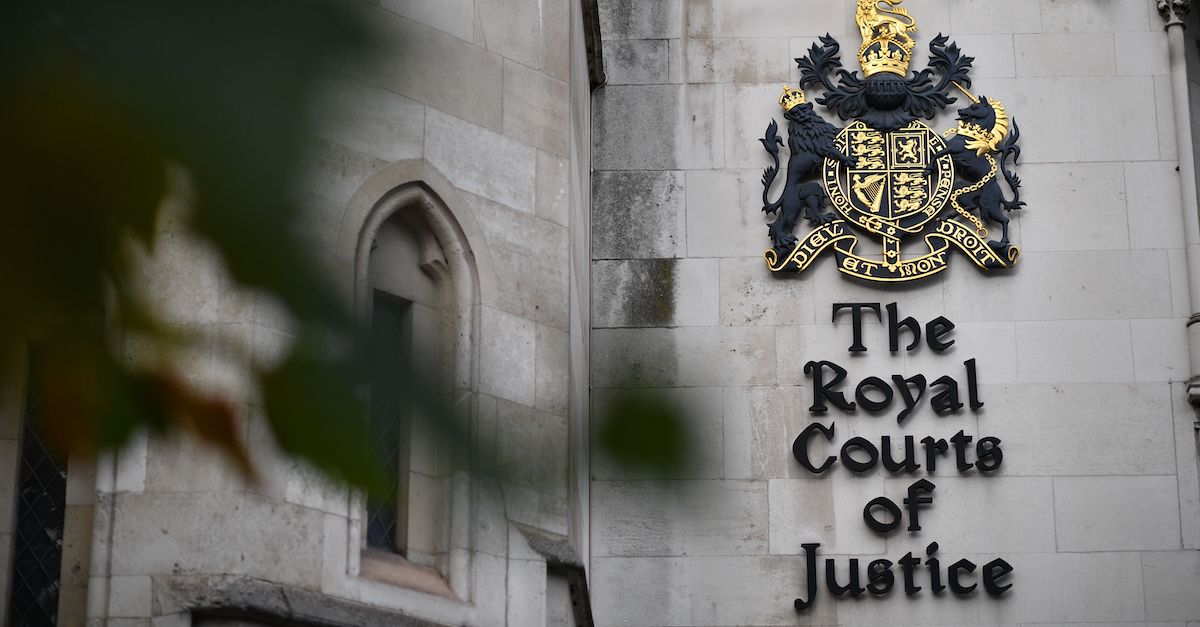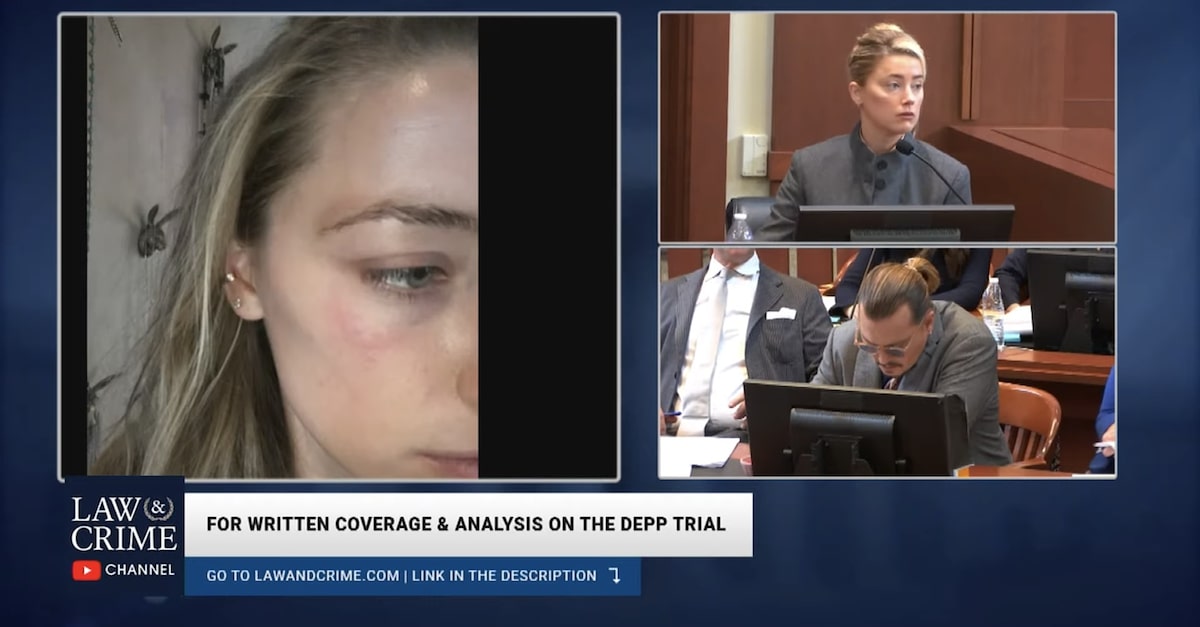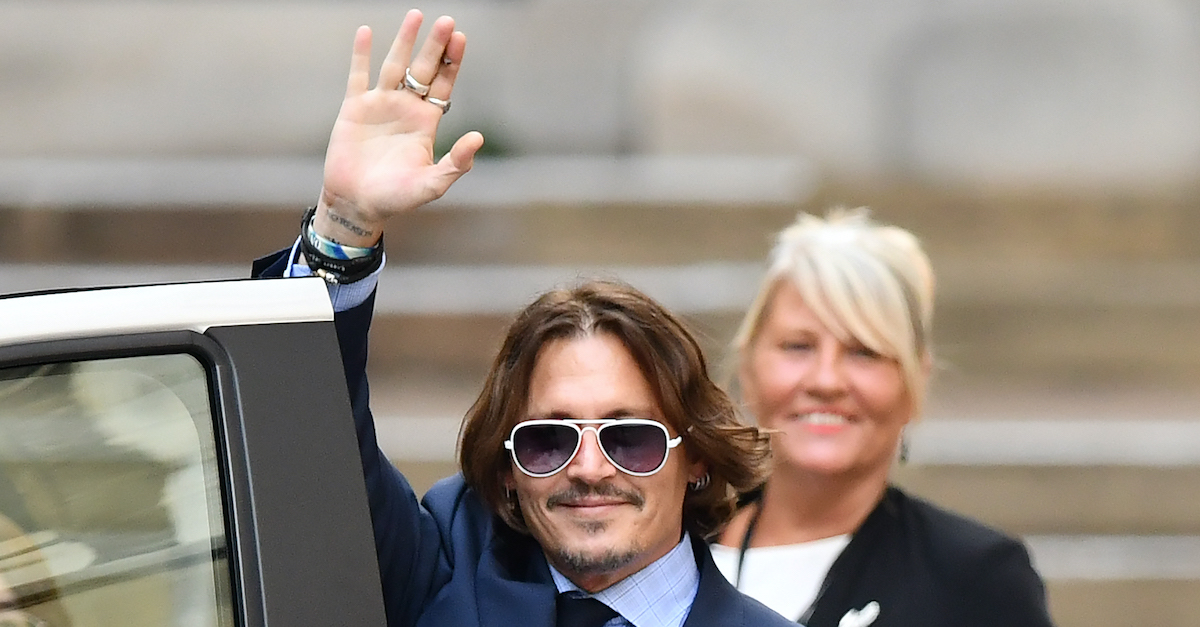
Signage is seen on the side of the Royal Courts of Justice where the High Court is located in London on Nov. 2, 2020, when actor Johnny Depp lost his libel lawsuit against British newspaper The Sun for branding him a “wife-beater.”
Listen to the full episode on Apple, Spotify or wherever else you get your podcasts, and subscribe.
After a Virginia jury handed Johnny Depp a resounding victory in his defamation battle, Amber Heard’s legal team floated new messaging: The verdict was a “tale of two trials“—the U.S. trial that the Pirates of the Caribbean star won and the U.K. one that he lost.
The latest episode of Law&Crime’s podcast “Objections: with Adam Klasfeld” takes a deep dive into the differences between the two legal systems, featuring an exclusive interview with a Swedish criminologist whose critique of the U.K. ruling made her the toast of Depp’s online supporters.
A prominent British barrister behind another high-profile defamation battle there picks apart the similarities and differences between the two systems. Both interviews took place on the day of closing arguments in Depp and Heard’s U.S. case, before they delivered their surprising—and, by some accounts, contradictory—mixed verdict.
That story begins with an academic journal that once had little name recognition beyond a small subset of mental health practitioners.
“This Is Not Rocket Science”
The Journal of Forensic Psychology Research and Practice isn’t the sort of publication known for going viral on the internet.
Then last August, the academic journal published an article by a Swedish academic, Professor Teresa Silva, with the unassuming title: “Assessment of Credibility of Testimony in Alleged Intimate Partner Violence: A Case Report.” The case study in question was the U.K. defamation trial brought by Johnny Depp.
Depp supporters hailed Dr. Silva’s opinion that a British high court judge got it wrong when he ruled that it was fair to call Depp a “wife beater.” It quickly became the academic journal’s most popular article, twice as widely read as any other piece listed on the journal’s website.
“It is always interesting when research can transcend the walls of academic institutions,” Silva told Law&Crime in an email.
Silva’s study serves as a microcosm about a legal battle between two U.S. celebrities became a global phenomenon shaping the perception of justice systems around the world. The Swedish academic describes the start of her unlikely journey: viewing photographs of Heard published by TMZ, the celebrity tabloid.
When asked why she thought something looked amiss, Silva sounded incredulous.
“This is not rocket science. It’s just common sense,” the professor said. “Look at the photos of Ms. Heard. There is only one photo in which it is visible or that it’s credible that there is a bruise. That is the photo of the arm, when she photographs the arm. But the rest of the photos: As the police said, ‘No, there [are] no bruises on there,'” referring to testimony to Los Angeles Police Department officers who found no signs of physical abuse.

Amber Heard testifies against Johnny Depp. She claimed that the she got the alleged bruise in the photo on the left after Depp threw a phone at her.
Silva added that she came to that judgment through her decade of experience as a nurse practitioner, tending to people with bruised faces, nose bleeds, and patterns of injuries on the lips. Heard has claimed that she thought Depp broke her nose, split her lip, and beat her so badly as to put her in fear for her life.
For Silva, the corroborating photographs did not rise to the level of Heard’s testimony.
So Silva said she was “shocked” when a U.K. judge reached such a starkly different conclusion, in a 129-page ruling systematically crediting a dozen of Heard’s domestic abuse allegations against Depp.
Calling the ruling a “miscarriage of justice,” Silva said that she tried to develop a system to assist justice systems in gauging the credibility of domestic abuse allegations. Her paper applies a six-factor test developed roughly two decades ago called Brief Spousal Assault Form for the Evaluation of Risk, or B-SAFER. The paper asserts that the test exposes Heard’s claims as lacking credibility.
“I wrote the article has a main way to say we need to implement this type of assessments within the justice systems,” Silva said.
“Transparency Is Everything”
A Virginia judge’s decision to allow the trial to be televised has given the case a massive, global audience, providing an intimate view of the contrasts between the U.S. and U.K. justice systems.
Prominent British barrister Gavin Millar, who represented The Guardian‘s investigative journalist Carole Cadwalladr in her high-stakes legal battle over her reporting on the Cambridge Analytica scandal, explains why his country is usually considered to be a tough jurisdiction for reporters and news organizations accused of defamation.
“The biggest obstacle we have here is that we don’t have a written constitution,” Millar noted. “So we don’t have the equivalent of the First Amendment, free speech guarantees that are given to American journalists and American media organizations by the First Amendment. And we probably have a culture in the courts that’s quite pro-claimant, or as you would call it, quite pro-plaintiff.”
So when Depp sued The Sun in the U.K, the Pirates of the Caribbean actor was in friendly territory—at least in theory. He didn’t have to prove his innocence. The British tabloid had to prove they didn’t defame him.
According to a high court judge, the newspaper met that heavy burden.

Johnny Depp waves as he leaves court after the sixth day of his libel trial against News Group Newspapers (NGN), at the High Court in London, on July 14, 2020. (Photo by JUSTIN TALLIS / AFP)
“So you have to persuade a judge who is an experienced lawyer, that you can make your way through all that complicated and intricate law to establish that your right to freedom of speech should win out over the claimant’s right to protect their reputation,” Millar noted. “And sometimes that’s very difficult to do.”
One of the most important differences between the two trials is that in the United States, TV cameras captured everything.
That’s not a very British approach, Millar notes.
“Your viewers couldn’t follow the Depp trial in England because we don’t allow cameras in court,” he noted. “We don’t even allow courtroom artists—get this—who are sitting watching the proceedings and doing drawings for the nighttime news, to do the drawings in the building. They can’t do it in the courtroom. […] They have to memorize what’s going on.”
Silva called the live-streamed proceedings a game-changer, allowing the public to engage beyond the cold record.
“Transparency is everything, right?” Silva asked.
“If we had access only to reading the transcriptions of the trial, I am quite sure that we will not have the same feeling and perception that we have now,” she added, referring to what she called Heard’s “theatrical” testimony.
“Nobody Wins”
Since U.K. defamation battles typically don’t have a jury, the judge employs a more permissive evidentiary standard and considers information that a jury typically would not see. British judges are also less likely to consider testimony from experts.
Frequently during Depp and Heard’s U.S. trial, the two have engaged in a battle-of-the-experts. A forensic psychologist retained by Depp diagnosed Heard with borderline personality disorder and histrionic personality disorder. A psychiatrist retained by Heard called Depp a narcissist. Orthopedic surgeons for both sides provided different explanations for how Depp lost his fingertip, and metadata experts presented different views whether Heard altered her photos. At every turn, each disputed the other’s findings.
Calling such wrangling “terrible” for her profession, Silva said adversarial expert testimony breeds cynicism about scientific manipulation. She believes experts should be neutral and court-appointed in a search for the truth.
On top of varying laws, the U.S. and U.K. courts assessed different facts.
Unlike The Sun’s editorial calling Depp a “wife beater,” Heard’s statements at issue are more ambiguous. The Aquaman actress did not name Depp in her Washington Post editorial in December 2018—or even explicitly describe herself as a survivor of physical or sexual violence in her marriage. Instead, she said that she became a “public figure representing domestic abuse” two years earlier, when she leveled those allegations at Depp. It was up to the jury to determine whether that carefully lawyered language rises to the level of defamation.
Unless jurors speak to the press, the public may never learn their reasoning.
“If you want to know why Amber Heard won the libel case in London, you can go to the judgment,” Millar noted. “It’s very long judgment, and erudite and detailed by a very clever judge, who listened to the evidence and then went away and thought about it, and knows the law backwards. And you can read it like a book, you can read exactly what the reasoning was. We wonder how reliable the outcomes are in America, when jurors try cases because you don’t you don’t get that sort of reasoning. You don’t get a judgment.”
As a result of the verdict, Depp may have largely rehabilitated his reputation, and Heard may have suffered reputational and financial devastation, but on one point, Silva and Millar agree: Neither Depp nor Heard truly will have won the case, whoever prevailed before the jury.
“Usually at the end of a libel trial, nobody wins,” Millar said. “I mean, I know somebody wins. But in reality, the process is damaging for both sides.”
Before even learning the ruling, Silva expressed confidence that the outcome will not affect her opinions of the trial either way. She noted that her study is not about meeting the standards of Virginia defamation law, and she will feel no vindication if a jury agrees with her views on Heard.
The journal’s editor Bruce A. Arrigo, a professor at the University of North Carolina at Charlotte’s Department of Criminal Justice and Criminology, did not respond to Law&Crime’s request for comment. Neither did Heard’s press representative.
Listen to the podcast below:
(Photo by BEN STANSALL/AFP via Getty Images)
Have a tip we should know? [email protected]